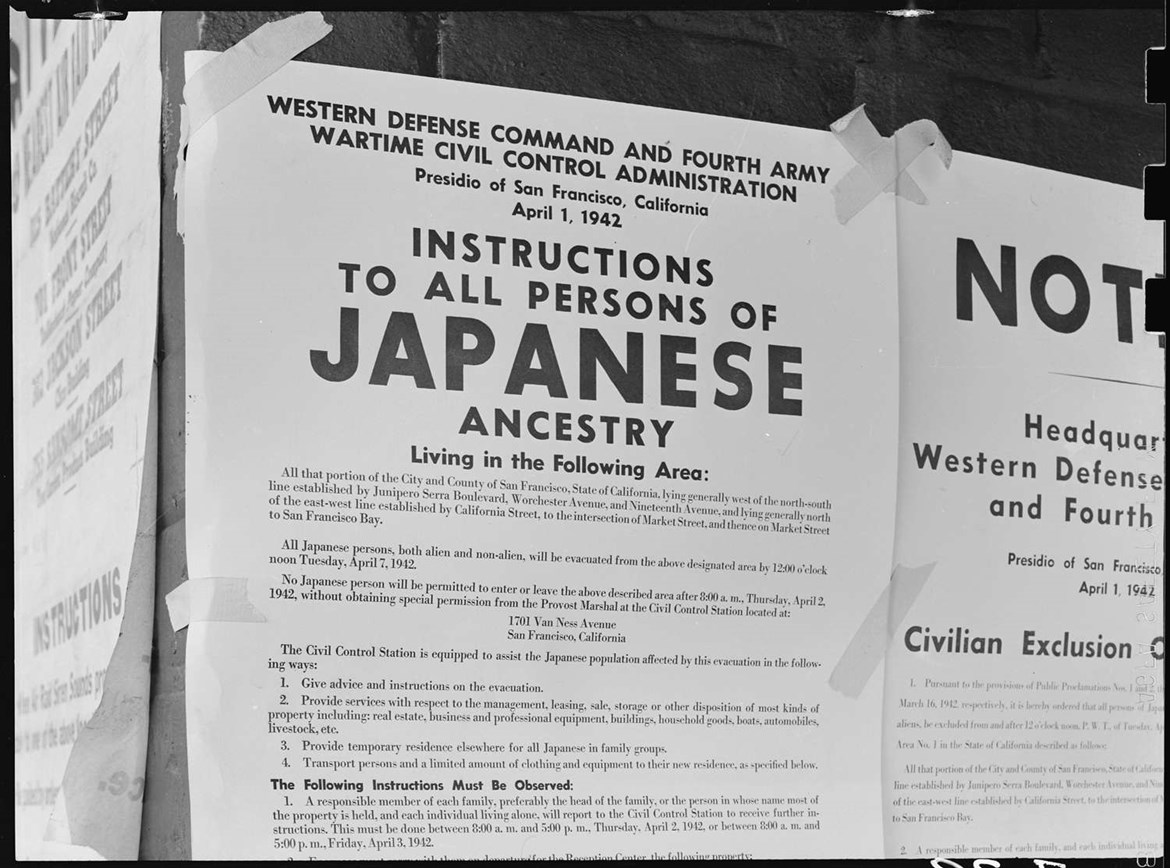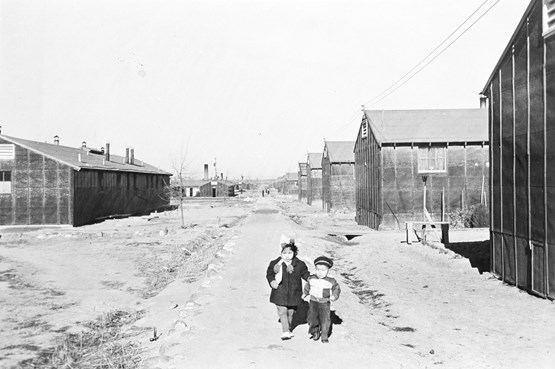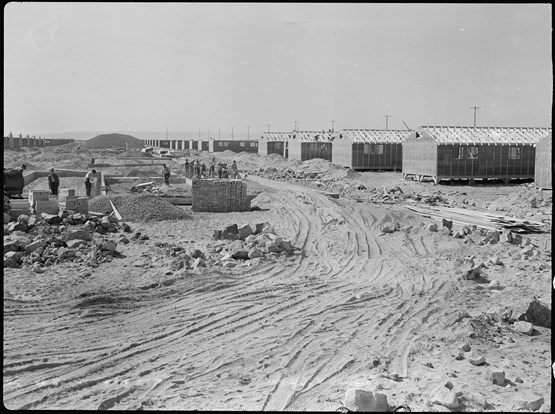Nisei Trials - September 1944
Nisei Trials in Boise - September 1944

Exclusion Order posted in San Francisco directing the removal of all persons of Japanese ancestry. Courtesy National Archives, 536017

Two children walking down a dirt road through Minidoka incarceration camp. Courtesy National Archives, 210-CMB-12-1488

Minidoka incarceration camp under construction in Idaho. Courtesy National Archives, 210-G-11D-105
In September 1944, thirty-six Japanese American men were tried before a federal judge in the Ada County Courthouse, located in downtown Boise, and prosecuted for resisting their draft notices during World War II. Their trials, known as the Nisei Trials, stand as a cautionary history of the violation of civil and human rights in Idaho and the United States.
Pearl Harbor and Executive Order 9066
After the attack on Pearl Harbor in December 1941, Japanese and Japanese American people were forcibly removed from their homes and incarcerated at camps across the West. President Franklin D. Roosevelt’s Executive Order 9066 authorized people to be held indefinitely without due process, meaning they could not appeal their incarceration through the court system. Japanese and Japanese American residents were confined for years in concentration camps throughout the West, and subjected to harsh, inadequate, and inhumane conditions.
Draft Notices at Minidoka
As World War II continued, the United States War Department announced that incarcerated Japanese Americans were subject to the military draft. In February 1944, draft notices were sent to eligible men held at the Minidoka War Relocation Center, a concentration camp located near Jerome, Idaho. While many incarcerees at Minidoka volunteered for military service, thirty-six men refused to appear for their pre-induction physical, and resisted their draft orders. They were arrested and sent to jails in Ada, Emmett, and Gem counties.
Nisei Trials
In September 1944, federal trials of the thirty-six draft resisters, also called the Nisei Trials, were held in Boise. The term Nisei refers to the children of Japanese immigrants, born in the United States. A crucial point to understanding the injustice of Executive Order 9066 is that most incarcerated people were US citizens. People were forced from their homes, lost their businesses, held without cause, and were unable to appeal their incarceration and be released. As one draft resister, Gene Hitoshi Akutsu, recalled in his oral history, “...you can’t make me go to war if you stick me into a prison camp.”
The Nisei Trials took place at the Ada County Courthouse in downtown Boise, with former Idaho governor and Federal Judge Chase Clark presiding. Clark had a long reputation for anti-Japanese advocacy. After the attack on Pearl Harbor, then-Governor Clark ordered Japanese nationals in Idaho remain in their homes. Although this order only lasted a few days, he called on law enforcement officials to keep close watch on them. In 1942, Governor Clark requested that Japanese and Japanese American residents in Idaho be incarcerated, even though Executive Order 9066 only applied to west coast states. He supported policies to prohibit Japanese people from leasing or purchasing land in Idaho and made further racist statements during a speech to the Grangeville Lions Club. Judge Clark’s very open racism and prejudice, and his failure to recuse himself from the case, did not offer much hope for the defendants.
A Guilty Verdict and Aftermath
The men on trial had been incarcerated at Minidoka prior to the trial; they had lost their homes, jobs, businesses, and had very little, if any, money. None of the defendants were able to hire their own lawyers. Judge Clark ordered every available attorney in Boise to come to his court, where he appointed them to represent one or two of the draft resisters. Gene Hitoshi Akutsu recalled that his attorney, R.R. Breshears, called him a “damn fool” and did very little to assist his eighteen-year-old client. The Idaho Statesman reported another attorney refusing to sit at the same table as his client, calling him a “traitor to his country.”
Each of the thirty-six defendants used similar arguments in their cases. They argued that a call to draft them into service was a violation of the Constitution, because they were “imprisoned and under the force and duress of the armed forces of the United States” at the time they were called. Judge Clark reportedly instructed the jury to ignore any testimony about how the US government treated the defendants. They were all tried by the same jury, and all were found guilty. Defendants were sentenced to eighteen months in prison, and those who tried to appeal their case further were sentenced to 3.5 years at McNeil Island Federal Penitentiary. World War II ended in 1945, but draft resisters from Minidoka remained in prison until 1947 when President Harry Truman issued a pardon.
Today, many people and organizations work to share the story of the Nisei Trials in Boise, and similar cases of Japanese Americans who resisted the World War II draft after their civil rights were violated. Learn more about these stories:
Friends of Minidoka
Densho
Minidoka National Historic Site
Japanese American Citizens League
Further Reading:
Free to Die for Their Country: The Story of the Japanese American Draft Resisters in World War II by Eric L. Muller
References:
For a complete list of references, please contact artsandhistory@cityofboise.org.
Special thanks to researcher and author Camille Daw.